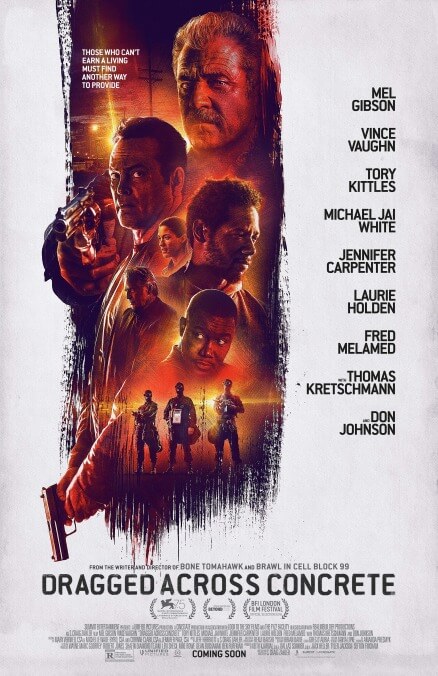Does Zahler identify with these human battering rams, with their complaints about a world where “political correctness” runs amok, where men act too much like women, where being labeled a racist can ruin your career? He doesn’t condemn them, exactly. They’re flawed but uncomfortably “likable” antiheroes, not outright villains—in part because Gibson, flintier than he’s ever been, and Vaughn, who Zahler credibly transformed into an old-school badass in Brawl, lend their characters a bruised humanity beneath the loathsome shit talk. The old-new hook of Dragged Across Concrete, which seems designed to offend, is that Zahler has inserted a couple of paradigms of ’70s macho cool into a world that now recoils from them. It’s as if Popeye Doyle were still cracking heads and racist jokes in 2019, nostalgically pining for the good ol’ days.
One could argue that neither are actually the protagonist. The first person we meet, after all, is Henry Johns (Tory Kittles), a black ex-convict being drawn back into a life of crime to support his struggling family. (That the film respects this rationale, and paints the character as possibly the most virtuous in a story with no conventionally “good” guys, at least complicates its #BlueLivesMatter appeal.) Henry will eventually cross paths with the two suspended cops, but not for a while. At a whopping two hours and 40 minutes, Dragged Across Concrete drags its feet, subverting the conventional wisdom that the best genre fare is ruthlessly efficient. That’s the unintuitive charm of Zahler’s work, which always takes the roundabout path, favoring prelude and delayed gratification. Here, the filmmaker makes a whole meal out of the “boring stuff” most thrillers dispense with on the way to the “good stuff”—ingeniously extending the standard “Are you in or out?” conversation that precedes a big job and devoting a few spare minutes to the home life of a side character (Jennifer Carpenter) about to be violently thrust into the middle of the story.
That story, incidentally, turns out to be pretty straightforward. Hard up, Gibson’s Ridgeman talks Vaughn’s Lurasetti into a side hustle with an indeterminate payoff, a stakeout to rip off some even shadier customers. Unfortunately, their targets are into something much bigger and deadlier than a mere drug or weapons deal. When the violence does arrive, it’s stark, visceral, and harrowing—Zahler both lays on the gore and captures it with dispassionate medium-take clarity, as if trying to bridge the arthouse and the grindhouse. Part of the perverse “fun” of this postmodern, nastily nihilistic movie is the way it takes what would be a single set-piece in a normal crime picture and extends it to nearly feature length. Yet the meat of Dragged Across Concrete is the supposed downtime, the scenes in the front seat of a car, watching two characters chew the fat (and the egg salad sandwich), working out the logistics and the ethics of their predicament. Zahler, one realizes, is the rare indie hotshot to take the right lessons from Tarantino’s playbook: not just to keep the dialogue hilariously flavorful but also to supply interior lives to his archetypes.
Conceptually and stylistically, it’s a tour de force. All that’s really required to enjoy the high-low B-movie pleasures is a strong tolerance for repulsively intolerant characters, and maybe a belief that this is one case where depiction does not equal endorsement—never mind that certain subplots, like the one involving the black kids harassing Ridgeman’s teenage daughter, seriously challenge that assumption. And of course, there’s also the tall order of stomaching Gibson in any role, even one that plays off his bad reputation and puts his advancing years to good use. “I don’t politic, and I don’t change with the times, and it turns out that shit’s more important than good, honest work,” his disgraced cop grumbles at one point, in a screed that must resonate with the actor delivering it. Like this new character, the one-time Martin Riggs is unapologetic. It’s him you want to see dragged—out of the spotlight, at least.

 Keep scrolling for more great stories.
Keep scrolling for more great stories.
